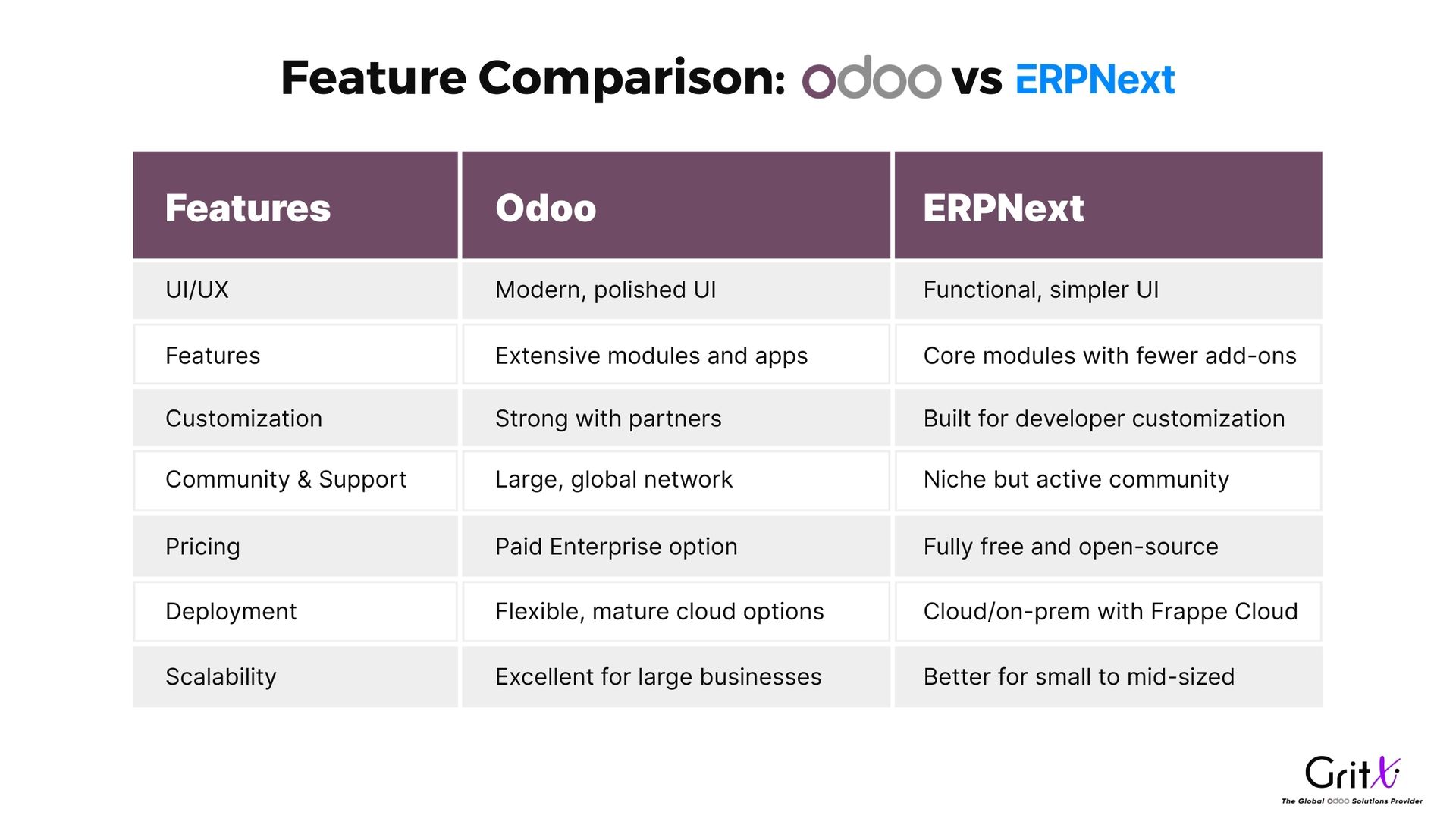In today’s competitive landscape, businesses are turning to ERP (Enterprise Resource Planning) systems to streamline operations, enhance productivity, and drive growth. Among the most talked-about ERP solutions are Odoo and ERPNext—both open-source platforms with strong communities and impressive functionalities. But which one truly aligns with your business needs?
This blog dives deep into both systems, exploring their features, scalability, pricing, community , and more to help you decide which ERP software is best for your business.
What is Odoo?
Odoo is a powerful open-source ERP solution known for its modular design and extensive range of business applications. With over 5 million users worldwide and a vast ecosystem of over 30,000 apps, Odoo offers everything from accounting and CRM to manufacturing and eCommerce.
Key Highlights of Odoo:
- 30+ core modules with thousands of third-party apps
- Flexible cloud and on-premise deployment
- Strong user interface and mobile-friendly
- Paid enterprise version with added features and support
- Backed by a global partner network and a massive community
What is ERPNext?
ERPNext is another robust open-source ERP designed to meet the needs of small to medium-sized businesses. Developed by Frappe Technologies, ERPNext is built on the Frappe Framework and focuses on simplicity, flexibility, and customization.
Key Highlights of ERPNext:
- 20+ built-in modules covering core business functions
- Fully open-source with no feature restrictions
- Hosted on the cloud or on-premise
- Built with Python and JavaScript using the Frappe framework
- Focused community with strong documentation
Feature Comparison: Odoo vs ERPNext
Let’s break down the key differences between Odoo and ERPNext across critical categories:
1. User Interface & Usability
- Odoo: Offers a clean, intuitive UI that feels modern and responsive. Navigation between modules is smooth, and the mobile app adds to the convenience.
- ERPNext: While functional, ERPNext’s interface is slightly less polished but still easy to use for those familiar with basic web tools. It may feel more technical for new users.
Verdict: Odoo takes the lead with a more polished and professional interface.
2. Modularity & Features
- Odoo: Extremely modular. You can start with CRM or accounting and scale up by adding more apps as needed. It covers nearly every business function.
- ERPNext: Also modular, but with fewer third-party extensions. Core modules include accounting, HR, CRM, inventory, and project management.
Verdict: Odoo wins with more modules and richer third-party ecosystem.
3. Customization
- Odoo: Highly customizable, especially in the enterprise version. It supports custom workflows, reports, dashboards, and apps.
- ERPNext: Built for customization using the Frappe framework. Developers can modify the source code or use built-in customization tools.
Verdict: ERPNext offers easier customizations for developers, while Odoo provides more power through its partner ecosystem.
4. Community and Support
- Odoo: Has a massive community of developers, functional consultants, and partners across the globe. Offers paid enterprise support and certified partners.
- ERPNext: Maintains an active open-source community. Frappe Cloud provides hosting and paid support directly from the core team.
Verdict: Odoo has wider global support options, but ERPNext offers more direct community involvement.
5. Hosting & Deployment
- Odoo: Offers cloud, Odoo.sh (customized cloud), and on-premise installations. Enterprise users get automated upgrades and backups.
- ERPNext: Supports cloud and on-premise hosting. Frappe Cloud is a popular managed hosting platform for ERPNext users.
Verdict: Both platforms offer flexible deployment, but Odoo has more mature cloud services.
6. Cost & Licensing
- Odoo: Offers a free Community version and a paid Enterprise version. The Enterprise edition includes extra features, security updates, and official support.
- ERPNext: Fully open-source with no feature limitations. Users only pay for hosting and support.
Verdict: ERPNext is more budget-friendly for companies that want full features without license fees.
7. Performance & Scalability
- Odoo: Built to scale with mid-sized to large enterprises. With load balancing and cloud capabilities, it can support multi-company and multi-country setups.
- ERPNext: Best suited for small to medium businesses. While it can scale, performance may require tuning for large deployments.
Verdict: Odoo is a better fit for enterprises needing advanced performance and scalability.
Industry Use Cases
Odoo:
- Ideal for businesses in retail, manufacturing, services, logistics, healthcare, and eCommerce.
- Used by companies like Toyota, Hyundai, and Danone for complex global operations.
- Highly suited for companies looking to digitize every aspect of operations with modular apps.
ERPNext:
- Preferred by small businesses and startups in education, NGOs, manufacturing, and services.
- Used by businesses that need full control over their ERP without vendor lock-in.
- Great for companies looking for an affordable, self-managed ERP system.
Pros and Cons Summary

Which ERP Should You Choose?
Choose Odoo if:
- You want a full-fledged ERP for all departments.
- You're a growing company planning long-term scalability.
- You prefer working with official partners for support and upgrades.
- You want an ERP that’s easy to scale across countries, teams, and verticals.
Choose ERPNext if:
- You’re a small business or startup with a limited budget.
- You want a fully open-source ERP with no feature lock-ins.
- You have in-house technical skills or a dedicated IT team.
- You prefer community-driven support and flexibility.
Final Thoughts
Both Odoo and ERPNext are powerful, open-source ERP systems that can transform your business operations. The right choice depends on your business size, technical resources, customization needs, and budget.
- Odoo is the best ERP for businesses looking for a feature-rich, scalable, and professionally supported solution.
- ERPNext is ideal for smaller businesses and tech-savvy teams seeking a customizable, fully open-source alternative.
Take the time to assess your company’s current needs and long-term goals. Whichever ERP you choose, implementing the right system will significantly improve your efficiency, data insights, and business agility.
Odoo vs ERPNext: Which ERP Software Is Best for Your Business?